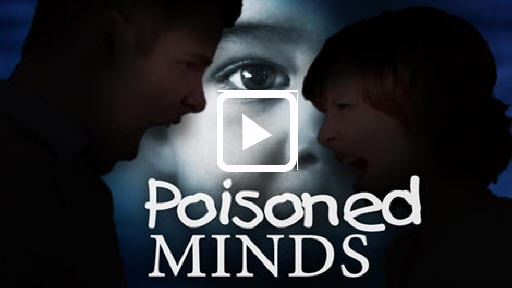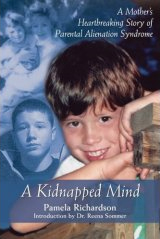About Parental Alienation
The parental alienation is a disorder that arises primarily in the context of child-custody disputes. Its primary manifestation is the child's campaign of denigration against a parent, a campaign that has no justification. It results from the combination of a programming (brainwashing) parents indoctrinations and the child's own contributions to the vilification of the target parent. The alienation usually extends to the non-custodial parent's family and friends as well.
Many children involved in divorce and custody litigation undergo thought reform or mild brainwashing by their parents. This disturbing fact is a product of the nature of divorce and the disintegration of the spousal relationship in our culture. Inevitably, children receive subtly transmitted messages that both parents have serious criticisms of each other.
Parental Alienation, however, is much more serious. It involves the systematic vilification by one parent of the other parent and brainwashing of the child, with the intent of alienating the child from the other parent
What happens when children are denied access to a parent and are victims of Parental Alienation?
Indian Journal of Psychiatry, 1988
A child who was separated from his or her father for a period of three
months or longer while between the ages of 6 months to 5 years old,
suffered a 2.5 to 5 times higher risk of conduct disorder, emotional disorders
and hysteria than a child that did not go through the same period of separation.
Bron, Strack & Rudolph, Univ. of Gottingen, Germany, 1991
Drastically increased suicidal tendencies were found in people who had
experienced the loss of the father.
American Journal of Orthopsychiatry, 1990
Children showed the most behaviour problems if their parents were in
a legal conflict and the visitation was not frequent or regular with
both parents.
Acta Psychiatrica, Scandinavia, 1990, 1993
Scandinavian research found a significantly higher number of
attempted adult suicides for people who, in childhood, had lost a parent through
parental separation or divorce.
British Journal of Psychiatry, 1989
British researchers found that adults who suffered the loss of a parent because of separation or divorce have a significantly higher risk of
developing agoraphobia with panic attacks and panic disorder.
Parental Alienation Disorder - TV Show
![]()
Parental Alienation - Grant Wilson, President, Canadian Children's Rights Council on national TV show - Canada AM
Canada AM is Canada's most watched morning TV show
This TV show about parental alienation aired March 26, 2009 across Canada on CTV's Canada AM. Read More ..
![]()
WHO considers adding 'parental alienation' to new diagnostic guide
CTV National News, Avis Favaro, Medical Specialist, Saturday, March 30, 2019
An emerging mental health issue in which one parent turns a child against the other parent could be added to the international standard for diagnostics next month.
"Parental alienation" may be among an updated list of diseases and related health problems when the World Health Organization votes to accept the 11th revision of the International Classification of Diseases (ICD-11) in May.
The issue is a kind of psychological manipulation of a child. It occurs when one parent systemically "badmouths" the other parent. In extreme cases of high-conflict divorce and separation, the child may align with one parent and reject the other. Mental health experts and law professionals are lining up to label it as a form of emotional abuse that can damage the mental health of children.
Research in the field has labelled parental alienation an "unacknowledged form of family violence" and has found long-term mental health consequences for children who experience it, including anxiety, lowered self-esteem and general quality of life, as well as a greater risk of depression. Read More ..
for other interesting information.-->
Canadian Children's Rights Council - See our whole section regarding fatherlessness and single parent families for increased rates of teen pregnancy, increased suicide rates and more. According to STATSCAN, the Government of Canada statistics agency, single parent families headed by men were 20% of single parent households in October 2007. Our position is that this growing trend will produce similar negative results for motherless children. Read More ..
Parental Alienation Syndrome (PAS): Sixteen Years Later
Academy Forum, 2001, 45(1):10-12 ( A Publication of The American Academy of Psychoanalysis ), by RICHARD A. GARDNER, M.D.
In 1985, the Academy Forum published my article, "Recent Trends in Divorce and Custody Litigation." This was the first article in which I described the parental alienation syndrome (PAS), a disorder that I began seeing in the early 1980s. The Forum article is generally considered to be the seminal publication on the PAS, parent to at least 100 peer-reviewed articles. Although this is certainly a source of gratification for me, the sixteen years that have ensued cannot be viewed as a straight path to glory, especially because of controversies that have swirled around the diagnosis. I address here the reasons for the controversies and provide suggested solutions. Read More ..
AMERICAN JOURNAL OF FORENSIC PSYCHOLOGY, VOLUME 15, NUMBER 4, 1997
THE SPECTRUM OF PARENTAL ALIENATION SYNDROME (PART II)
Forensic Psychologist, Deirdre Conway, Rand, PhD
This article reviews the literature on the Parental Alienation Syndrome (PAS) as formulated by Dr. Richard Gardner and seeks to integrate his work with research on high conflict divorce and the work of other professionals in this arena. Parental Alienation Syndrome (PAS) is a distinctive form of high conflict divorce in which the child becomes aligned with one parent and preoccupied with unjustified and/or exaggerated denigration of the other, target parent. In severe cases, the child's once love-bonded relationship with the target/rejected parent is destroyed. Part II begins with sections on the child in PAS, the target/alienated parent and the third parties who become involved, including family, friends, lawyers, mental health professionals, and sometimes cults. The material presented on PAS in the legal arena is devoted to what attorneys and judges have to say about PAS, which can be a key issue in certain depend ency and criminal proceedings, as well as in family law court. The discussion of forensic evaluations and PAS includes contributions by custody evaluators and others who recommend considering PAS as a possible explanation when child sex abuse is alleged in certain contexts. Case vignettes in Part II illustrate psychological maltreatment of the child in severe PAS, a case in which Child Protective Services was mobilized to bring pressure on the alienating parent to reverse the PAS, and the use of PAS testimony in criminal proceedings against a falsely accused parent. Part III will be devoted to interventions in PAS, including some difficult but effective interventions implemented by the author, her husband, Randy Rand, Ed.D., and a team of interveners, including the judge and guardian ad litem. Read more..
Family Wars: The Alienation of Children
NEW HAMPSHIRE BAR JOURNAL, Volume 34, No.1, March 1993
The parents of Amy (age 10) and Kevin (age 7) are divorcing after 13 years of marriage. Their father, by temporary stipulation, has moved from the marital home. He is entitled to visit with the children on alternating weekends and one evening during the week. Soon the children begin to refuse to go with him. At first, they do not want to leave Mom; they say that they are afraid to go. When Dad comes to the house, Mom tells him that she will "not force the children to go." "Visitation is up to them." and she will "not interfere in their decision". The children refuse to talk with him on the phone. Mom calls him names when he telephones and complains constantly about her financial situation, blaming him, all within hearing of the children. Read more..
![]()
Parental alienation syndrome leaves bruises deep inside
The Toronto Star, by Susan Pigg, 31 March 2009
In the end, it was one tiny voice that silenced anyone who still had doubts that parental alienation is real and one of the most insidious forms of child abuse.
The voice wasn't real ??? Dashiell Hart opened his arms wide and threw himself off a Vancouver bridge eight years ago at the age of 16.
But his voice was brought to life at a Toronto conference by his devastated mother, Pamela Richardson, who endured a 12-year court battle with her ex-husband to try to win back the heart and mind of her son.
Dash was just one tiny soldier in the growing army of children who are becoming collateral damage in bitter battles between ex-spouses that are overwhelming Canada's divorce courts, the first Canadian Symposium for Parental Alienation Syndrome (PAS) heard recently in Toronto.
"Over 12 years I had four different sets of lawyers trying to convince the courts my son, who lived less than 10 minutes' drive from me, needed to see the mother who loved and raised him," Richardson told the conference. Read More ..
![]()
FAMILY LAW
Parental alienation cases draining court resources
Study says such cases should be moved out of court system, handled by individual judges
The Globe and Mail, by KIRK MAKIN, JUSTICE REPORTER, May 13, 2009
An escalation in parental alienation allegations is draining valuable courtroom resources, a major study of 145 alienation cases between 1989-2008 concludes.
"Access problems and alienation cases - especially those which are Read More ..vere - take up a disproportionate amount of judicial time and energy," said the study, conducted by Queen's University law professor Nicholas Bala, a respected family law expert.
"One can ask whether the courts should even be trying to deal with these very challenging cases." Read More ..
![]()
Mother loses kids for anti-dad stance
The Australian, Australia's national daily newspaper, by Caroline Overington, March 31, 2009
TWO children who have been in the care of their mother since their parents separated in 2005 have been sent from Hobart to live with their father in Melbourne after the Family Court heard the mother encouraged them to have "negative" feelings about their dad.
The two children - a girl, aged nine, and a boy, aged seven - had been struggling with "change overs" between parents, saying things such as "I don't want to go" and "I don't have to go" when their father arrived in Tasmania from Melbourne to collect them for access visits.
The court found the mother did not discourage them from saying these things, and did not encourage a positive relationship between the children and their father. Read More ..
Parental Alienation in family law cases - One American high profile case
Read the story in the American magazine Newsweek and then read the information provided by the court office
Newsweek wrote:
"It took six years for Genia Shockome to gather the courage to leave her husband, Tim. He pushed her, kicked her and insulted her almost from the moment they married in 1994, she says. She tried to start over with their children when the family moved from Texas to Poughkeepsie, N.Y. It didn't last long. Tim called her constantly at work and, after they split up, pounded on her door and screamed obscenities, she alleged in a complaint filed in 2001. Tim was charged with harassment. As part of a plea deal, Tim agreed to a stay-away order--but denies ever abusing her or the children. In custody hearings over the past six years, Tim has insisted that he's been a good father, and argued that Genia's allegations poisoned their children against him. The judge sided with Tim. This summer he was granted full custody of the kids, now 11 and 9. Genia was barred from contacting them." Read More ..
![]()
Judicial passivism turning fathers into deadbeats
Judges refuse to enforce Divorce Act section that embraces equal access to child
The Edmonton Journal, Grant A. Brown, Freelance, Saturday, June 17, 2006When mothers lose in court, they are not made to pay court costs -- again on the premise that this would only take money away from the children. But payment of penalties and costs is merely a transfer between parents, and only prejudice supports the proposition that fathers would be less generous toward their children than mothers, given the time and financial ability to do so.
Contrast the endless lame excuses judges use not to impose remedies for access denial with their attitude toward making and enforcing child-support orders. Read More ..
Parental alienation gets a day
Tribune, U.S.A., By Kathleen Parker, May 12, 2006
Proclamations generally have the same riveting power as supermarket ribbon-cuttings, but a recent one in Maine is being celebrated as a small victory for children and noncustodial parents wounded by divorce.
The proclamation, signed by Gov. John E. Baldacci, recognized April 25 as "Parental Alienation Awareness Day."
If you don't know what "parental alienation" is, you probably haven't had the pleasure of a divorce with children. Veterans of those wars know without a governor's seal exactly what it means - agony for a noncustodial parent and emotional problems for children alienated from one parent. Read More ..
Sexual Abuse Accusations Color Custody Battles
Consider child's age, physical or mental disabilities, feelings of
alienation when evaluating allegations.
Clinical Psychiatry News, U.S.A., June 2005 Volume 33 Number 6, Heidi Splete, Senior Writer
HOUSTON, U.S.A. Sexual abuse allegations in a child custody case are not always true, and even professionals who work with these children can have trouble distinguishing fact from fantasy in the children's stories, Joseph Kenan,M.D., said at the annual meeting of the American Society for Adolescent Psychiatry.
When a forensic psychiatrist evaluates potential sexual abuse of a child in a custody case, he or she considers a host of factors, including the child's age, any physical or mental disabilities, and a child's feelings of alienation toward one parent or history of siding with one parent during arguments, he said at the meeting cosponsored by the University of Texas Southwestern Medical Center at Dallas.
Although psychiatrists use careful questioning and information-gathering skills to evaluate children's allegations, a study of 12 professionals showed that none of them could tell the difference between true and false stories after viewing videotapes of 10 different child testimonies, said Dr. Kenan, chief forensic psychiatrist at the Psychological Trauma Center, a nonprofit organization affiliated with Cedars-Sinai Medical Center in Los Angeles. Read More ..
Does DSM-IV Have Equivalents for the Parental Alienation Syndrome (PAS) Diagnosis?
Richard A. Gardner. M.D.
Department of Child Psychiatry, College of Physicians and Surgeons
Columbia University, New York, New York, USA click here
Psychiatric disorder may have led boy to fatally shoot father
Rick James Lohstroh, a doctor at UTMB, was fatally shot this summer, apparently by his 10-year-old son.
ABC13 Eyewitness News, Houston, Texas, U.S.A., Dec. 29, 2004
The 10-year-old Katy boy accused of murdering his father this summer is now the face of an unofficial psychiatric disorder that may have lead to his father's death. Read More ..
Billboards remember slain dad
Houston Chronicle, Feb. 13, 2005
Some new billboards in Houston are intended to keep alive the memory of Dr. Rick Lohstroh, the surgeon who police say was shot and killed by his 10-year-old son last year.
Several of Lohstroh's friends have formed a group called Help Stop Parental Alienation Syndrome, named for the unofficial disorder that they say contributed to the 41-year-old father's death.
Lohstroh's family and friends believe his 2003 divorce was so contentious that his ex-wife turned their children against him, setting the stage for the Aug. 27 shooting. Read More ..
Remarriage as a Trigger of Parental Alienation Syndrome
The American Journal of Family Therapy, 2000
By Richard A. Warshak of the University of Texas Southwestern
Medical Center at Dallas, Dallas, Texas, USA
Read More ..
The Emerging Problem of Parental Alienation
by Caroline Willbourne and Lesley-Anne Cull, Barristers, December 1997, Fam Law p. 807-8 Read More ..
Custody and Visitation Interference: Alternative Remedies
American Academy of Matrimonial Lawyers Journal, Winter 1994,
By Joy M. Feinberg and Lori S. Loeb
The potential for psychological and physical damage to children of divorce and the parental relationship looms as a potential harbinger of doom over every divorce case. This specter becomes reality when one parent interferes with the rights of custody or visitation of the other parent by preventing the child from visiting the other parent, or by kidnapping or secreting the child from the parent who has the right to custody or visitation.
This article will discuss the visitation and custody interferences that occur during divorce and alert practitioners and judges to the psychological damage to the children. This article will review the alternative remedies available to circumvent custody and visitation interference and address the problems associated with enforcing these remedies. This examination will reveal that the available remedies lose effectiveness proportionate to the severity of the interference with custody and visitation rights. Read More ..
Interference with Parental Rights of Noncustodial Parent as Grounds for Modification of Child Custody
Divorce Litigation, by Edward B. Borris, Assistant Editor, January, 1997, p. 1
Interference by one parent in the relationship of a child and the other parent is almost never in the child's best interests. In fact, in extreme cases, actions by one parent to alienate the affections of the child from the other parent, to interfere win the other parent's visitation rights, or to remove the child to a distant state or country can often lead to liability in tort. See generally E. Borris, "Torts Arising Out of Interference with Custody and Visitation," 7 Divorce Litigation 192 (1995). Tort liability is not always an option, however, as many courts refuse to award damages based upon interference with visitation rights. E.g., Cosner v. Ridinger, 882 P.2d 1243 (Wyo.1994). Read More ..











